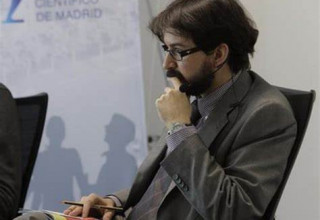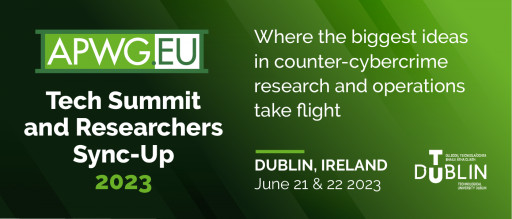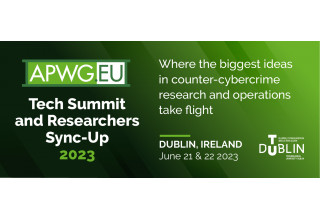CAMBRIDGE, Mass., April 3, 2023 (Newswire.com) - The APWG.EU Technical Summit and Researchers Sync-Up 2023 (Tech 2023) on June 21 & 22, 2023, at Technological University Dublin, will convene cybercrime researchers and industry responders from across the globe to confront the cybercrime onslaught that today threatens commerce and culture in most every polity on earth.
Conference notes page and registration link here: https://apwg.eu/event/tech2023/
The APWG.EU's 2023 program will expand its conference portfolio from peer-reviewed cybercrime-related research papers to include an expanded second-day chalk-talk session - the Researchers Sync-Up - that will review vital, long-horizon research projects in motion and will posit important R&D efforts that need to be mounted to establish the tools, metrics and infrastructure required to forestall the pervasive and, possibly, irreversible criminalization of cyberspace.
APWG.EU Director of Research Dr. Agusti Solanas said, "Research to fight cybercrime has to be multidisciplinary, and the Sync-Up session will be the agora where researchers from all over the world will share their ideas to foster collaboration amongst a variety of fields."
APWG.EU Tech Summit and Researchers Sync-Up will present state-of-the-art research into cybercrime investigations, forensic techniques and infrastructure defense against cyber-attacks and manipulation. The program's topic spaces will feature innovations in cryptocurrency cybercrime tools and response approaches; research into the technical, legal, political, social and psychological aspects of fraud and fraud prevention; and case studies into new and emerging cybercrime attack methods.
This year's Researchers Sync-Up is a moderated session in which leading investigators and interdisciplinary innovators will present their long-term cybercrime research objectives and discuss: Why is this research needed? What is lacking to interrogate this important but as yet unexplored research dimension? Sync-Up enables big ideas to find the investigators with the tools, the will and the data to drive cybercrime research into the future. Interaction, discussion, and multidisciplinary collaborations will be fostered. Focus areas for Sync-Up include but are not limited to: metrics and categorization schema; data exchange and data logistics challenges; and uncharted behavioral questions in cybercrime research.
Dr. Solanas, recently appointed chair of European Cybersecurity Organization Subworking group 6.2 (Digital Transformation in Verticals) and Subworking group 6.3 (Data & Economy), is reviewing Sync-Up talk proposals personally with APWG.EU program managers and consulting advisors. Investigators with proposals to share can reach Dr. Solanas at: asolanas@apwg.eu
Tech 2023 will look into the many new and emerging challenges facing cybersecurity, the most common and predictable cyberthreats, and incident responses at any scale. Tech 2023 presenters and delegates will review the development of response paradigms and resources for counter-cybercrime managers and forensic professionals in both the private and public sectors. As always, the program's managers and presenters will look out for opportunities for building bridges of cooperation and collaboration.
Presenters will review case studies of national and regional economies that have come under attack, and illustrate some examples of successful transnational forensic investigation cooperation. At the same time, Tech 2023 will explore possible models for consultation and collaboration against e-crime, and examine the available resources for cybercrime response and forensic enterprises in general.
APWG.EU Tech Summit and Researchers Sync-Up 2023 will take place in Dublin, Ireland, June 21 & 22, 2023, at the campus of Technological University Dublin. (Central Quad - TU Dublin - Grangegorman Lower, Dublin 7, D07 ADY7, Ireland)
CALL FOR PAPERS
APWG.EU Technical Summit and Researchers Sync-Up 2023 is a two-day event focused on electronic crime with a research and interdisciplinary programme consisting of invited keynotes, interactive panels, and chalk-talk sessions. The event's objective is to bring together academic researchers from multiple disciplines, industry security practitioners, government representatives, and law enforcement officials to discuss and exchange ideas, experiences and lessons learned while combating cybercrime from a polyhedric perspective.
This year's programme includes a chalk-talk lab session "the Researchers' Sync-Up". Sync-Up is a moderated chalk-talk where leading investigators and interdisciplinary innovators discuss their next five years of cybercrime research. Why is this research needed? What is lacking to commit to this direction? Sync-Up enables big ideas to find the investigators with the tools, will and data to drive cybercrime research into the future. Interaction, discussion, and multidisciplinary collaborations will be fostered. Focus areas for Sync-Up include but are not limited to: metrics and categorization schema; data exchange and data logistics challenges; and uncharted behavioral questions in cybercrime research.
IMPORTANT DATES:
- Papers submission: May 1, 2023
- Notification of Acceptance/Rejection: May 21, 2023
- Authors registration: May 28, 2023
- Conference data: June 21-22, 2023
Articles' topics may include, but are not limited to:
- Electronic crime research and innovation
- Cryptocurrency and related cybercrime, tools, and responses
- Artificial Intelligence in Cybercrime and its prevention
- Case studies of current attack methods, including phishing, malware, rogue antivirus programs, pharming, crimeware, botnets, and other emerging techniques.
- Technical, legal, political, social and psychological aspects of electronic crime and its prevention.
- Malware, botnets, cybercriminal/phishing gangs, or money laundering.
- Cybersecurity in specific markets: financial services, e-commerce, health, energy & supplies.
- Techniques to avoid detection, tracking and take-down; proactive ways to counteract such techniques.
- Designing and evaluating user interfaces with fraud and network security in mind.
- Behavioral aspects of cybercrime resilience and susceptibility in ICT users.
- Best practices for detecting and preventing damage to critical internet infrastructure.
- The economics of online crime.
- Approaches and/or research to measure the impacts of cybercrime
AUTHORS' GUIDANCE
- Tech Summit has adopted the CEUR publication format. Submissions should be in English, in PDF format with all fonts embedded, formatted using the CEUR template. The CEUR-template for APWG.EU Tech / Researchers can be found here: CEUR-Template-2col.docx (live.com) The overleaf page can be found here: https://www.overleaf.com/project/5e76702c4acae70001d3bc87
- Papers should be prepared in two-column format described in the template above
- Submissions should be anonymized, excluding author names, affiliations and acknowledgements. Authors' own work should be referred to in the third person.
- Committee members are not required to read the appendices, and papers should be intelligible without them.
- Submissions must be original and unpublished.
- Authors of accepted papers must present them and register at the event.
Submission Types
- Regular papers: max 12 pages of practical and/or theoretical content describing advances in the fight against Electronic Crime and any of the topics listed in the CFP.
- Short papers/Posters: max 6 pages of practical and/or theoretical content describing unfinished, ongoing research with preliminary (not yet conclusive) results.
- Position papers: max 6 pages with content where authors discuss their opinions on Electronic Crime related fields. Discussion on regulations, policies, draft standards, and similar topics to foster discussion are welcome.
- Researchers Sync-Up Chalk-talk papers: max 4 pages with research ideas for principal investigators and motivated researchers willing to explore collaborations and looking for synergies in Electronic Crime related fields. Interdisciplinary proposals are particularly welcome. These papers are aimed at fostering collaboration, discussing groundbreaking ideas, and forging lasting research collaborations amongst the attendees.
For paper submissions, use the New Submission option at https://ecrime2023sync-up.hotcrp.com/
About the APWG.eu: The APWG.eu, established in 2013 as the Anti-Phishing Working Group European Foundation, is an industry association focused on unifying the global response to cybercrime. The organization provides a forum for responders and managers of cybercrime to discuss phishing and cybercrime issues, to consider potential technology solutions, to access data logistics resources for cybersecurity applications, to cultivate the university research community dedicated to cybercrime research, and to advise government, industry, law enforcement and treaty organizations on the nature of cybercrime.
Contact Information:Zoriana Dmytryshyna
Director of Institutional Relations
zoriana.dm@apwg.eu
+34 618 782 169
Related Images

Dr. Agusti Solanas - URV \/ APWG.EU
Dr. Agusti Solanas - URV \/ APWG.EU - General Chair 2023 Tech Summit and Researchers Sync-Up
Original Source: APWG.EU 2023 Technical Summit and Researchers Sync-Up Builds Bridges of Cooperation Across the Globe — and Across Research Disciplines





